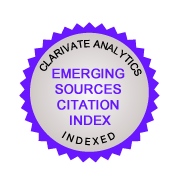ATTACHMENT AS A PREDICTOR OF UNIVERSITY ADJUSTMENT AMONG FRESHMEN: EVIDENCE FROM A MALAYSIAN PUBLIC UNIVERSITY
DOI:
https://doi.org/10.32890/mjli2017.14.1.5Keywords:
Emerging adulthood, peer attachment, university adjustment, gender, perceived adult statusAbstract
Purpose – Building upon attachment theory and emerging theory, the current study was aimed at examining the effect of peer attachment in predicting adjustment to life in university among freshmen in a public unirvsity in East Malaysia. Furthermore, it sought to examine the influence of gender and perceived-adult status as moderators of the relationship between student attachment and student adjustment.Methodology – Data was collected from 557 freshmen in one of the government universities in East Malaysia. Two questionnaires, namely The Inventory of Parent and Peers Attachment (IPPA) and The Student Adaptation to College Questionnaire (SACQ) were used in this study. Partial Least Square (PLS) analysis was employed to examine the hypothesized relationships.
Findings – The findings of the study showed that peer trust positively influenced academic and social adjustment. Meanwhile, peer communication positively influenced social adjustment, but negatively influenced personal-emotional adjustment. Lastly, peer alienation negatively influenced personal-emotional adjustment, but positively influenced institutional attachment. The Partial Least Square - Multi Group Analysis (PLS-MGA) results indicated no significant differences in peer attachment and university adjustment across gender and perceived-adult status.
Significance – The findings of this study has empirically proven the link between attachment theory and emerging adulthood theory, providing further corroborative evidence for the argument put forth by Howes and Spieker (2008) on the alternate attachment bond during emerging adulthood period. In terms of practical benefits,, several parties who work with emerging adult clients in the Malaysian university setting will be able to benefit from the research findings, particularly counsellors and academicians.



























